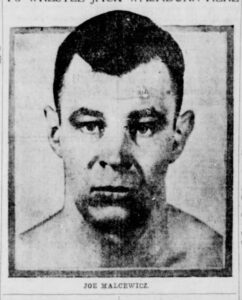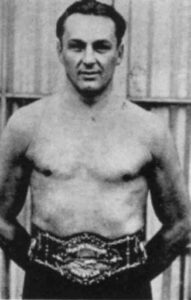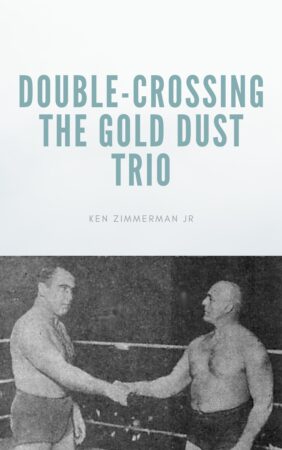Double-Cross Gone Wrong
Whether it was a double-cross or an attempt to setup a legitimate contest, Paul Bowser’s attempt to secure a match between Joe Stecher and Joe Malcewicz nearly resulted in a riot on March 11, 1926. Events of the previous year actually set this debacle into motion.
From the end of 1922, the Gold Dust Trio of Ed “Strangler” Đồ dùng móc đá lên cao, his manager Billy Sandow and training partner/promotional partner Joseph “Toots” Mondt dominated wrestling. They set the rules, and if promoters or wrestlers resisted, they were frozen out of using Lewis.

Photo of Joe Malcewicz from the Public Domain
Losing the ability to book the world champion adversely impacted promoters ability to make big money. Wrestlers frozen out of working with the Gold Dust Trio would also suffered financially. The Trio’s dominance created a lot of enemies.
Trong 1925, the Trio finally made a mistake by putting the championship on a non-wrestler, or performer. Sandow had Lewis drop the world championship to “Lớn” Wayne Munn, a college football player with no wrestling skill but great box office drawing power. Sandow only let Munn wrestle with people he trusted to keep the title from being taken by a skilled wrestler.
Sandow trusted Stanislaus Zbyszko but a group of promoters and wrestlers led by Jack Curley and the Stecher brothers paid Zbyszko to shoot on Munn and defeat him legitimately. Zbyszko then dropped the title to Joe Stecher in a worked match in St. Louis.
Boston promoter Paul Bowser was allegedly part of the conspiracy in 1925. The trouble began when the plotters tried working together. Joe Stecher feared one of the other conspirators may double-cross him. Even though Stecher was a skilled wrestler able to beat most other wrestlers not named Lewis, a double-cross involving referees would be harder to block.
Due to his concerns over double-crosses, Joe Stecher virtually retired the championship. Like Sandow before him, Stecher and his brother/manager Tony Stecher would only accept bookings with promoters or wrestlers they trusted. Stecher may have also suffered from the mental health challenges, which would confine him to a mental health facility for the latter part of his life.

Joe Stecher with his championship belt (Tên miền công cộng)
Bowser was able to book Joe Stecher but the Stecher brothers showed concern when the agreed upon referee was switched for the March 11th match. Anthony Stecher demanded Joe’s fee upfront, which Bowser declined, further raising the Stechers’ suspicions.
Bowser later claimed the Stecher brothers agreed to meet anyone so he didn’t let the brothers know Joe’s opponent before hand. This scenario is unlikely to implausible. Fearing double-crosses, the Stechers would have demanded to know the opponent even from Bowser.
Stecher was already in the ring, when Jake Bressler entered the ring to wrestle him for the championship. Neither Stecher appeared concerned over a challenge from Bressler.
A few minutes later, Joe Malcewicz, a much better legitimate wrestler, jumped into the ring in street clothes. When Malcewicz stripped to reveal ring attire under his clothing, the Stecher brothers realized Bowser was trying to take the title from Joe despite their previous agreement. The switch of referee and opponent was too much to ignore.
Bowser assumed a proud man like Joe Stecher would wrestle Malcewicz anyway but he miscalculated. Joe simply left the ring. He and Tony refused the match, dressed and left.
The referee Leon Burbank awarded the match and championship to Malcewicz on a forfeit. It was a hollow victory. None of the governing bodies or state athletic commissions would recognize Malcewicz as World Champion. Tuy nhiên, Bowser’s actions almost caused a riot.
Boston Police had to surround the ring to keep the fans back from attacking everyone in the ring. The fans were furious they had spent money on such a farce.
The Stechers told the newspapers that Bowser had promised them $12,500.00 to defend the title. He refused to pay before the match knowing what he was planning. He still hadn’t paid them a few days later.
This incident further strained the working relationship amongst the conspirators and seriously hurt professional wrestling at the box office. Something would have to be done soon.
You can leave a comment or ask a question about this or any post on my Trang Facebook.
Source: The Tampa Times, Diễu hành 12, 1926 edition, p. 35
Pin It

